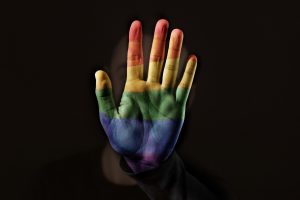Being LGBTQ+ in Tajikistan means leading a difficult life. Faced with social stigma, discrimination, extortion, and abuse by law enforcement, members of the community are subjected to severe exploitation and their rights are violated on a systemic level.
According to a local civil society activist in Tajikistan, who spoke to the International Partnership for Human Rights (IPHR) on condition of anonymity, the government of Tajikistan does not see LGBTQ+ people as “fully human.” Khurshed Kungurotov, chief psychiatrist of the Ministry of Health and Social Protection in Tajikistan, described homosexuality as “a complete aberration.” The authorities portray themselves as protectors of morality and will adopt harsh measures to prevent LGBTQ+ people from living their lives in Tajikistan.
When Tajikistan began drafting comprehensive anti-discrimination legislation, human rights defenders and LGBTQ+ people were hopeful that the law would provide some level of protection and clarify that discrimination against sexual minorities is illegal. But, according to our sources, by the time the Law on Equality and Elimination of all Forms of Discrimination was adopted, the authorities had removed the words “gender,” “gender identity,” and “sexual orientation” from the list of prohibited grounds for discrimination.
Officers from the police force, technically responsible for upholding the law and protecting people, instead cause fear in the LGBTQ+ community by using extortion and blackmail to extract money from LGBTQ+ people, and by physically and sexually abusing them. IPHR documented numerous cases over the past couple of years where police have abused their position to systematically exploit LGBTQ+ people.
In one case, Zafar*, a gay man, reported that he was summoned to a police station where two policemen sexually abused him and forced him to provide the contact details of wealthy gay men. When he complied, he was released. Another gay man, Komil*, was abducted by police in broad daylight and taken to the police station. There he was insulted for being gay, and officers reportedly beat him when he refused to give them the contact details of his intimate partners. Eventually, they offered to release him in exchange for money, and he agreed. Cases like these illustrate how police actively use members of the LGBTQ+ community to extort money from others, thus sowing seeds of division and mistrust inside the community.
The situation has also been exacerbated by the alleged existence of a list of members of the LGBTQ+ community kept by the Ministry of Internal Affairs. If such a list exists, this puts the LGBTQ+ community at risk of exploitation and involuntary “outing.”
In Tajikistan, being LGBTQ+ is considered shameful. When a person is “outed” to relatives, neighbors, or employers as belonging to the LGBTQ+ community, they risk being kicked out of their home, losing custody over children, and being dismissed from their job.
Beaten down by discrimination and stigma, many members of the LGBTQ+ community flee Tajikistan. Only few find a safe haven, while many remain vulnerable to abuse and exploitation as undocumented migrants; many find that sex work is their only option for income. There are lot of cases of Central Asian LGBTQ+ people who have fled to Russia thinking that things could not get worse, but in fact they did.
And, as if the situation is not bad enough already, members of the LGBTQ+ community are being blamed for the HIV epidemic in Tajikistan. This is despite the fact that HIV in Tajikistan is mainly spread through heterosexual intercourse. The Tajikistani authorities also violate people’s human rights by routinely carrying out forced HIV testing – and LGBTQ+ people are often targeted.
A lesbian couple, Giti* and Gulnaz*, were forced to undergo HIV testing in 2023. Gulnaz tested positive. Giti had been aware of her partner’s status and they took precautions, so she had no claims against Gulnaz. But police allegedly beat Giti and forced her to accuse her partner of deliberately infecting her with the virus. Gulnaz was convicted and sent to prison.
LGBTQ+ people in Tajikistan experience daily hardships due to their orientation and lifestyle. It is time for Tajikistan to move into the 21st century and realize that inhuman treatment of human beings on the basis of who they love and who they are is not the foundation of a modern and just society. Tajikistan cannot disregard its international human rights obligations, which are applicable to all.
*Names have been changed to protect identities.
































